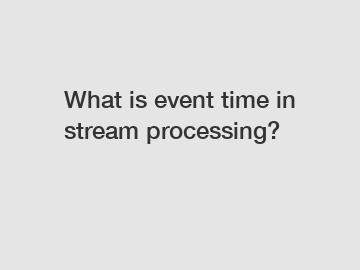What is event time in stream processing?
In today's fast-paced world, real-time data analysis has become essential for various industries such as finance, healthcare, marketing, and more. To harness the true potential of streaming data, stream processing systems rely heavily on event time. In this blog, we will dive into the concept of event time, exploring its significance, benefits, and how it enhances stream processing to extract actionable insights efficiently.
Defining Event Time:
Event time refers to the occurrence time associated with each event in a stream of data. Unlike system time (time when an event arrives at the processing system), event time represents the time when the event actually happened or was recorded.

Significance of Event Time:
1. Accurate Analysis: By considering event time, stream processing systems can provide accurate analysis of data, even when events arrive out of order or with varying delays. This is crucial for applications where the order of events matters, such as financial trading platforms or fraud detection systems.
2. Real-time Decision Making: Event time allows organizations to make timely decisions based on up-to-date data. By incorporating event time into stream processing, businesses can react quickly to emerging trends, customer behavior, or potential threats.
3. Handling Late Data: In practice, complete datasets are often not immediately available due to network delays or late-arriving events. Event time enables stream processing systems to accommodate such late data arrivals, ensuring that they are handled correctly and their impact on analysis is considered.
Benefits of Event Time Stream Processing:
1. Correcting Out-of-Order Events: Events in a stream may not always arrive in the same order they were generated, causing discrepancies if not handled properly. Event time provides a mechanism for reordering events based on their original occurrence time, ensuring accurate analysis.
2. Time Windowing: Event time allows stream processing systems to define time windows for analysis, enabling calculations or aggregations over specific intervals. This facilitates tasks like calculating hourly sales, average customer behavior over a day, or trending topics within a specific time frame.
3. Handling Data Delay and Latency: In some scenarios, events might experience delays before reaching the stream processing system. Event time ensures that such delays are accounted for, mitigating the issue of stale or outdated analysis caused by waiting for delayed events.
4. Watermarking: Stream processing frameworks use watermarking techniques to measure the completeness of event time data at any given point. Watermarks act as indicators in the timeline, allowing systems to determine when to consider a time window as complete and trigger downstream computations.
Event Time in Practice:
Implementing event time in stream processing involves several components, including timestamp extraction, event reordering, windowing, and watermarking. This requires a robust stream processing framework that supports event time semantics and provides the necessary infrastructure for accurate analysis.
Challenges and Considerations:
While event time brings numerous advantages to stream processing, it also poses challenges that need to be addressed. Some of these challenges include handling out-of-order events, network delays, clock synchronization, and the trade-off between latency and correctness of analysis. Stream processing systems must employ techniques like event-time-based buffering, watermarked time synchronization, and advanced reordering mechanisms to tackle these challenges.
Conclusion:
Event time is a critical concept in stream processing that enables accurate, timely analysis of real-time data. By incorporating event timestamps, stream processing systems can handle out-of-order events, late arrivals, and varying delays, ensuring accurate and meaningful insights. Moreover, event time empowers organizations to make timely decisions by harnessing the power of timely data. As the demand for real-time analytics continues to grow, understanding and embracing event time in stream processing becomes crucial to stay ahead in this rapidly evolving data-driven world.
If you want to learn more, please visit our website aws slack channel, slack billing, Event Streaming Platform Vs Message Queue.
199
0
0

Comments
All Comments (0)